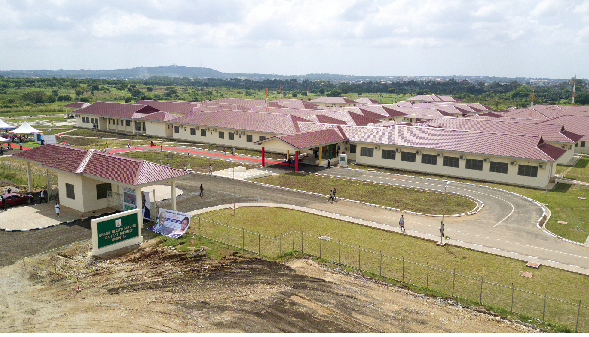
Ga East Hospital COVID-19 fight -New standard for health infrastructure
In November 2020, the Ga East Municipal Hospital in Kwabenya in the Greater Accra Region marked a year's anniversary since it was commissioned, but in March this year, it stands high, in the modesty of its status, as Ghana's foremost health centre in the management of COVID-19.
Originally conceived and constructed to serve the basic health needs of that part of the capital, it instead assumed the bigger responsibility of spearheading the intervention for a national crisis.
And as fears turned to deaths and threatened to ruin society, the fresh environs of the hospital offered the perfect ambience to calm the nerves of the nation's anxiety.
It is one of nine health facilities built or still being built across the country by Euroget De-Invest, an Egyptian investment company, to improve and upgrade healthcare delivery in, particularly, deprived communities.
Even the idea alone looked noble at the conception stage, but none might have anticipated the crucial role of such facilities when the world was being forced onto its knees by a pandemic that entered unceremoniously with a sucker punch.
Changed dynamics
While the Korle Bu Teaching Hospital, Komfo Anokye Teaching Hospital, 37 Military Hospital, and lately the University of Ghana Medical Centre remain and maintain their prestigious selves as the foremost health centres in the country, there is no use stressing the fact that Ghana cannot have a tertiary or higher health centre in every district and region. But the modestly beautiful infrastructure of those Euroget projects have already had their impact.
Apart from the 160-bed regional hospital in Wa in Upper West, the 250-bed facility at Sewua in Ashanti, and the military hospital at Afari, also in Ashanti, all of the Euroget projects are 100-bed or smaller capacity hospitals. But what they lack in size, they compensate for with a range of systems that cover a wider spectrum of competences and expertise hitherto only available at the bigger hospitals.
Indeed, the dynamics have changed so much that Ghana's modern-day district/municipal hospital has become a competent referral facility with full capacity to accommodate and execute moderately complex surgical procedures in specialised fields of medicine.
Examples
Examples are found in Wa where the new regional hospital currently undertakes more complex surgeries, including bone-related procedures, that were previously referred to the Nandom Hospital and other centres from the old regional hospital mostly because it lacked the necessary equipment to handle the medical procedures.
Even more impressive, each of the new hospitals contains at least four operating theatres covering different specialties, a laboratory, and a radiology department equipped with ultrasound, echocardiography, and x-ray machines.
They operate dental clinics, along with cardiology, ophthalmology, paediatric, gynaecology, and orthopaedic departments for outpatient services.
The new facilities also offer some other 'luxuries' in their individual mini markets, laundry services, kitchen services, dining halls, and housing blocks for lactating mothers. All these are part of the standard complementary facilities that include high-tech power plants to ensure uninterrupted power supply, ambulance stations for emergency services, treatment plants for sewerage and medical waste, and water treatment and supply systems.
New standard
That they come with staff accommodation, vast stretches of internal roads, covered walkways, and — in the case of the Afari Military Hospital — a helipad is only a testament of the new standard that defines the physical architecture of the new hospital environment.
Along with the expanded and upgraded scope of services, the new hospitals may well be the template for the government's Agenda 111, which has become the blue print for Ghana's health infrastructure in the foreseeable future.
It has become critical not to compromise or lower standards given the emergency that attended COVID-19's emergence, both in the world and in Ghana. After all, health is an emergency issue.
The availability of the Ga East Municipal Hospital when the pandemic broke in Ghana might have obscured the dire constraints of Ghana’s health infrastructure, but the situation cannot mute the potential threat if such a facility was not readily available. That is why Agenda 111, which promises this number of new hospitals around the country, must not be merely celebrated for the intention; it must be backed by action into fruition.
Warranty
For now, the likes of the Ahafo Ano North Municipal Hospital at Tepa in the Ashanti Region and the Tain District Hospital at Nsawkaw in the Bono Region and the others already in operation will have Euroget’s continued visible presence to provide remedial works on building structures during the defects liability period, warranty maintenance of medical equipment for 12 months after handing over, and post-warranty maintenance of medical equipment for a further 24 months when the warranty period expires.
